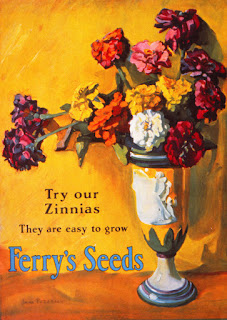Dexter M.
Ferry (1833-1907) was a businessman from Detroit, Michigan who founded D. M.
Ferry & Co., at one time the largest seed company in the world.
How many of
you have heard of Mr. Ferry or his seeds?
Had I not been looking at pictures of old seed catalogs I’m not sure I
would have bothered to dig a little deeper.
I'm glad I did because Ferry is
the kind of rags to riches story or better yet, work and succeed story we’ve
come to identify as American.
His father
died when he was three and at 16 (along with going to school in the winter) he
began working at his Uncle’s farm for $10 a month. At 18, he secured a position as an errand boy
at a stationery firm. He advanced to
salesman and then bookkeeper.
At 23, he
became a junior partner at a seed growing company. When Ferry became full owner, it became D. M.
Ferry & Co. He introduced several
innovations in the seed-vending business:
Sold only fresh seeds which increased germination rates and established
a reputation for quality. He was among
the first to sell seeds in small packets.
The company
survived and even prospered after a warehouse fire taking out one million
dollars of their stores. In the early
1900s, the company was doing over two million dollars in sales.
They grew their own seeds on extensive land holdings. The operation included greenhouses, hybridization operations, large barns for horses and farming equipment, houses for employees, packaging and distribution buildings and more.
In
addition, he shared his business acumen with many companies and philanthropic organizations. A tale of hard work, intelligence and
success.
Ferry
merged his company with C.C. Morse & Co. in 1930 and it became the
Ferry-Morse Company. It became the
largest seed distribution company in the world.
In 1981, it became part of France’s Groupe Limagrain, the largest seed
producer in the world. In 2005, Groupe
Limagrain sold Ferry-Morse to Jiffy International (a Norwegian Company) and
still sells seeds.
Memorabilia from D. M. Ferry & Co. is highly prized and collectable. In addition, there are many historical collections available for viewing.




No comments:
Post a Comment